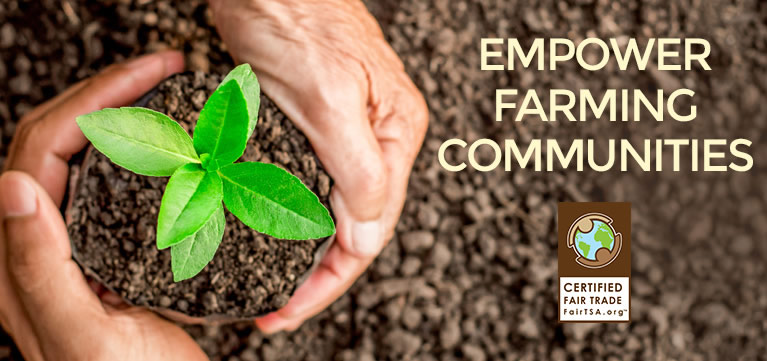FAIR-TRADE PRODUCTS
The Fair-Trade movement is a social response to the conventional trading system by which many farmers and workers have been deprived or disparaged. Buying Fair Trade products is a more effective way of facilitating supportable development than traditional charitable donations and aid, as it allows better trading conditions and sustainable farming for workers and farmers in developing countries.
All our fair-trade products are certified by Fair Trade Sustainability Alliance (FairTSA). FairTSA products support agricultural sustainability and equity in working conditions while empowering workers to know their rights, participate in community change, and gain access to better living conditions.
WHAT IS A FAIR-TRADE PRODUCT?
A Fair-Trade product, which includes agricultural products and crafts, is made in an environment that ensures the producers are granted better, fairer prices, improved working conditions, and fair terms of trade so that the working and living environment of their communities will be supported in their development and protection. The standard for Fair-Trade products is for workers to feel empowered to develop businesses that are competitive and prosperous. Therefore, products can not be cultivated through forced labor, child labor, or in any conditions that are otherwise harmful to workers. The Fair Trade Certified™ label signifies that consumers are purchasing goods that are socially and environmentally responsible.
WHY IS THE PRODUCT A LITTLE MORE EXPENSIVE?
Paying for Fair-Trade products ensures that producers receive fair wages that reflect their efforts as well as the cost of sustaining production. It also contributes to the elimination of mistreatment and sweatshop labor.
HOW IS IT HELPING TO IMPROVE THE LIFE OF LOCALS?
The practice of maintaining Fair-Trade standards and selling Fair-Trade products ensures significant improvements in the lives of the locals from the areas in which they are produced. Receiving fair prices for their work, as well as longer-term contracts, allows them to enjoy increased security both economically and socially.
For producers, fair-trade guarantees a minimum floor price when global commodity prices decrease, and this prevents farmers and workers from finding themselves in destitute conditions. The Fair-Trade movement allows workers to earn more money for their creations than they usually would and makes it easier for them to sell their products to consumers in developed countries. The Fair-Trade Premium, a supplementary amount of money, is put into a communal fund to be used by the workers and farmers in a way that they feel is appropriate for enhancing their conditions, both financial and environmental, whether it is through education, health care, the improvement of their crop yields, or by buying processing facilities. Fair-Trade had humble beginnings, starting out as a single farmer co-op with a few hundred farmers.
With the encouragement of better pay, working conditions, and living conditions than those offered in the conventional marketplace, the Fair-Trade movement has expanded to over 800 co-ops in 58 countries that export their products in the international Fair-Trade market.
FAIR-TRADE LICENCE (FAIR TSA)
The Fair-Trade Certification focuses on fair working wages and conditions, as well as preservation of eco-systems.
The primary objectives of fair-trade are:
- To ensure appropriate working, health & safety conditions
- To preserve ecosystems and protect endangered species
- To practice sustainable waste management techniques
- To ensure that prices paid to producers / farmers are at least 5% above the comparable prices in the region
|
FairTSA Licensed Partner Certificate
|
 |


